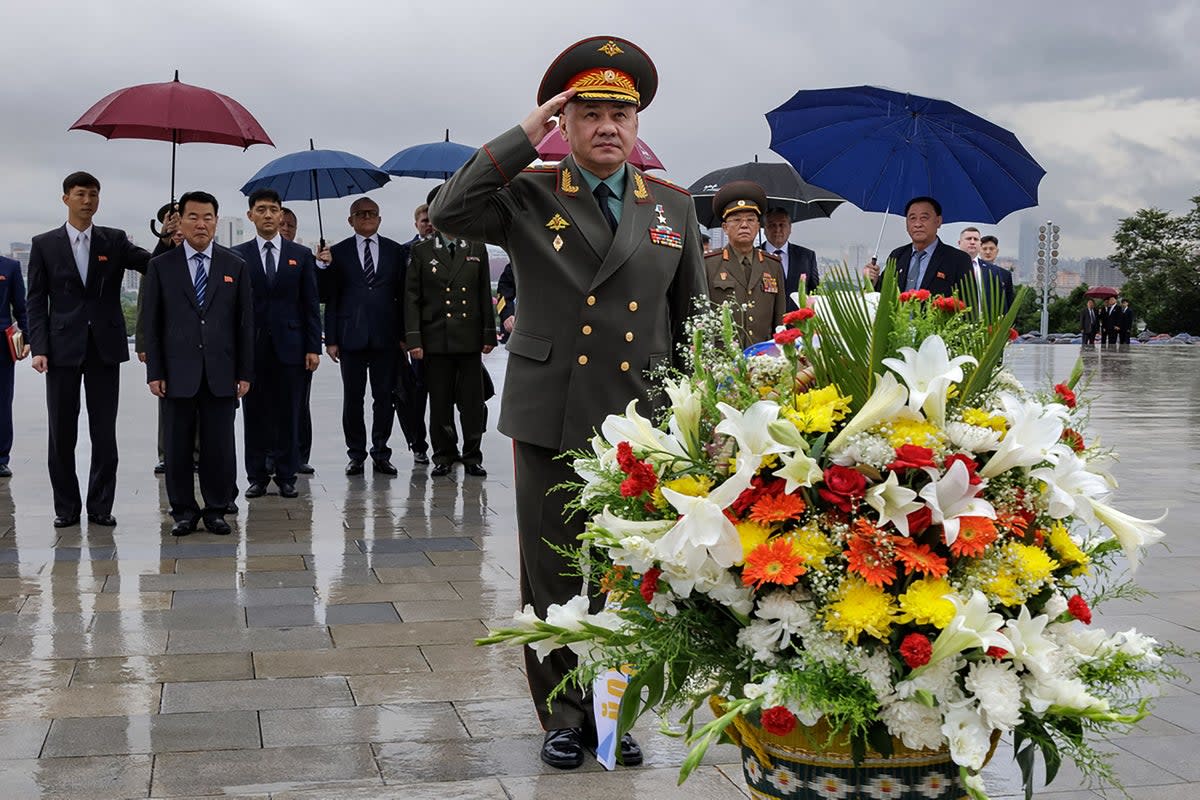China and Russia to join North Korea’s Korean War celebrations in a first after pandemic

Official delegations from Russia and China are set to attend North Korea’s 70th anniversary celebrations of armistice that halted the 1950-53 Korean War, in a display of diplomatic bonhomie with the Kim Jong-un regime.
Russia’s delegation, led by defence minister Sergei Shoigu, arrived in Pyongyang on Tuesday evening and was greeted by senior North Korean officials that included defence minister Kang Sun Nam, reported the North’s state media on Wednesday.
A statement released by Russia’s defence ministry said Mr Shoigu held a meeting with Mr Kang for talks he said would “help strengthen cooperation between our defence departments”.
Visuals from the meetings showed the leaders, including Mr Shoigu, laying wreaths at a Soviet war monument in Pyongyang and saluting the city’s statues of Kim Il Sung and Kim Jong Il, the grandfather and father, respectively, of current North Korean leader Mr Kim.
China’s ruling Communist Party also dispatched a midlevel official, Li Hongzhong, in hopes of restoring exchanges at a time when the West has firmly opposed both China and North Korea.
This also marks the hermit kingdom’s first display of opening up its borders for diplomatic exchanges after years of isolation exacerbated by the pandemic.
High-level preparations are underway in capital Pyongyang where the anniversary celebrations of armistice are expected on Thursday and will likely be capped off by a military parade in the capital.
North Korean leader Mr Kim uses parades every year to showcase his most powerful, nuclear-capable missiles designed to target neighbouring rival South Korea and the US.
This is the only second known time where a visit by a foreign delegation has been seen in North Korea since the start of the pandemic. Reports had earlier stated that the east Asian nation’s people had greatly suffered under the regime that had downplayed a severe Covid outbreak.
In March earlier this year, North Korea saw the arrival of China’s ambassador to Pyongyang, Wang Yajun, according to South Korea’s Unification Ministry, which handles inter-Korean affairs.
State media reports said Mr Kim and his top defence and foreign policy officials visited two cemeteries, including one for Chinese troops who died while fighting alongside North Korea during the war in the 1950s.
The siege was launched by North Korea in an unsuccessful attempt to conquer its southern rival and did not see any peace treaty to end the conflict. As a result, the border between the Koreas remains one of the most tense in the world.
The battle saw forces from the newly created People’s Republic of China, aided by the then Soviet air force, while South Korea, the US and troops from various countries under the direction of the UN battled to repel the North’s invasion.
The North still celebrates the armistice as a victory in the “Grand Fatherland Liberation War”.
At the cemeteries, Mr Kim expressed gratitude for Chinese soldiers who died in the war, calling them “martyrs” who would be “immortal in the hearts of the Korean people”.
Experts have warned that North Korea might ramp up its weapons tests around the anniversary of the armistice on Thursday.
The country has already conducted three separate rounds of missile firings since last week in protest of the US sending naval vessels – including a nuclear-armed submarine – to South Korea in a show of force.
Since the beginning of last year, North Korea has test fired around 100 missiles. Mr Kim exploited the distraction created by Russia’s war on Ukraine to accelerate the expansion of nuclear-capable weapons he sees as his strongest guarantee of survival.


